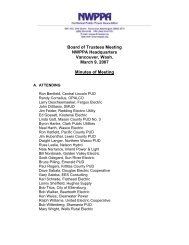by Scott M. Lindsay - Northwest Public Power Association
by Scott M. Lindsay - Northwest Public Power Association
by Scott M. Lindsay - Northwest Public Power Association
You also want an ePaper? Increase the reach of your titles
YUMPU automatically turns print PDFs into web optimized ePapers that Google loves.
y Richard G. Lorenz and <strong>Lindsay</strong> R. Kandra<br />
Does the Uniform Commercial Code apply<br />
to power purchase or sale agreements?<br />
An unsettled question with potentially significant consequences<br />
O<br />
Legal<br />
ne thing that all consumer-owned<br />
utilities have in common is power<br />
contracts. All utilities have at<br />
least one wholesale power purchase<br />
agreement. Utilities that have their own<br />
generating resources or have made forward<br />
power purchases will also likely<br />
need wholesale power sales agreements<br />
to deal with surplus power. Many consumer-owned<br />
utilities have special contracts<br />
with large retail customers. What<br />
these utilities may not realize, however,<br />
is how their legal rights and obligations<br />
under these different power contracts<br />
may be affected <strong>by</strong> the Uniform<br />
Commercial Code.<br />
The Uniform Commercial Code<br />
(UCC) is a set of model statutes that,<br />
when adopted <strong>by</strong> individual states,<br />
allow commercial organizations to do<br />
business across jurisdictional boundaries<br />
with the certainty that virtually<br />
the same rules will apply in each jurisdiction.<br />
The UCC has been adopted <strong>by</strong><br />
all states relevant to NWPPA, including:<br />
Washington, Oregon, Utah,<br />
Alaska, Idaho, Montana, and<br />
California. Article 2 of the UCC governs<br />
transactions in the sale of<br />
“goods.” The term “goods” is defined<br />
in the UCC as “all things that are movable<br />
at the time of identification to a<br />
contract for sale.”<br />
For purposes of this article, the<br />
question is whether the sale of electrical<br />
power qualifies as a sale of<br />
“goods” governed <strong>by</strong> Article 2 of the<br />
UCC. Although this seems like a simple<br />
proposition, the question remains quite<br />
unsettled <strong>by</strong> the legal system. In a<br />
recent unpublished decision, Enron<br />
<strong>Power</strong> Marketing, Inc. v. Nevada<br />
<strong>Power</strong> Co., the Southern District Court<br />
of New York, interpreting Utah law,<br />
held that power sold under the Western<br />
Systems <strong>Power</strong> Pool (WSPP) agreement<br />
14 NWPPA Bulletin August 2009<br />
does constitute a “sale of goods” governed<br />
<strong>by</strong> the UCC. The Enron <strong>Power</strong><br />
Marketing decision relied on previous<br />
cases holding that “electricity is a commodity<br />
which, like other goods, can be<br />
manufactured, transported and sold.”<br />
(Baldwin-Lima-Hamilton Corp. v.<br />
Superior Court.)<br />
But other courts have reached the<br />
opposite conclusion. In Bowen v.<br />
Niagra Mohawk <strong>Power</strong> Corp., for<br />
example, a New York state court held<br />
that the sale of electricity is more analogous<br />
to the provision of service than<br />
the sale of goods. As such, the court<br />
concluded that a sale of electricity<br />
under New York law is not subject to<br />
the provisions of the UCC. An Indiana<br />
state court (Hedges v. <strong>Public</strong> Service<br />
Co. of Indiana) specifically held that<br />
“high-voltage” electricity that caused<br />
an accident was not “the good” that<br />
was subject to the transaction. This<br />
case implies, but without so holding,<br />
that high-voltage wholesale power<br />
transactions are not subject to the<br />
UCC, while lower-voltage retail sales<br />
are subject to the UCC. The end result<br />
of these conflicting legal decisions is<br />
that nobody can predict with reliable<br />
certainty how a specific court in a specific<br />
state, under a specific set of facts,<br />
will decide the question.<br />
The question of whether the UCC<br />
applies to a particular transaction<br />
could have important consequences for<br />
the contracting parties. In most jurisdictions,<br />
the common law of contracts<br />
differs from the UCC terms. The following<br />
is a non-exclusive list of issues<br />
that may be affected <strong>by</strong> the UCC:<br />
• Warranties. The UCC requires<br />
that a good be merchantable (i.e.,<br />
reasonably fit for the ordinary<br />
purposes for which such product<br />
is manufactured and sold) and fit<br />
for the purpose that the buyer<br />
requires. These warranties can be<br />
disclaimed or limited, but specific<br />
language and procedure is<br />
required.<br />
• Remedies. The UCC gives both<br />
buyers and sellers remedies that<br />
may not exist under the common<br />
law. For example, the UCC gives<br />
buyers the right to revoke acceptance<br />
of a good or demand specific<br />
performance from a seller<br />
when a good is “unique.” Sellers<br />
are expressly allowed to refuse<br />
delivery if the buyer is insolvent<br />
and to compute any money damages<br />
for non-acceptance of a<br />
good using the market price for<br />
that good.<br />
• Modification. If the parties agree<br />
to renegotiate and lower the price<br />
term of a contract, the UCC<br />
allows such modification without<br />
the buyer promising to give any<br />
thing in exchange for the lower<br />
price term. In contrast, most state<br />
contract laws would require the<br />
buyer to give additional consideration<br />
for the lower price term.<br />
• Statutes of limitation. Under the<br />
UCC, parties must typically bring<br />
an action for breach of contract<br />
within four years of the breach.<br />
The common law statutes of limitations<br />
can vary from one year to<br />
over six years.<br />
• Adequate assurances. The UCC<br />
allows a party to demand and to<br />
suspend its own performance<br />
under a contract if it does not<br />
receive adequate assurance of<br />
performance. Common law<br />
would generally treat such unilateral<br />
suspension of performance as<br />
a breach of contract.




